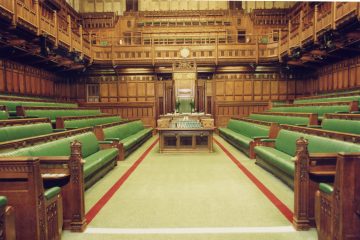
Trump’s “wall” vs. Clinton’s “glass ceiling”: symbolic campaigning in the US elections
When Hillary Clinton won the nomination as the Democratic Party’s presidential candidate in July 2016, she celebrated her victory speech with words that foreshadowed her campaign message: Tonight, we’ve reached a milestone in our nation’s march toward a more perfect union: the first time that a major party has nominated a woman for president…When any barrier falls in America, for anyone, it clears the way for everyone. When there are no ceilings, the sky’s the limit. In this exuberant declaration, Clinton introduced the image of the glass ceiling which spoke of a female president who would pave the way for not just her success but the success of all female Americans. This focus on women in America is closely linked …

Populism on the Rise? The Brexit Vote and Beyond
The outcome of the British referendum on European Union (EU) membership has sent shockwaves across the globe that are still reverberating. Politically, the two major political forces in Westminster, the Conservative and Labour parties, are in disarray about how to shape UK’s ongoing relationship with the EU once we leave. Prime Minister Theresa May faces the daunting task of organising the British exit from the EU whilst keeping her party and country together. There are question marks over not only Britain’s new relationship with the EU, but also our partners within the British Union. Hot on the heels of the Brexit vote came the election of Donald Trump as president of the United States of America. This has been widely …

Fake News? The blame-game in a post-Trump world
Donald Trump’s victory came as a surprise and/or shock to most pollsters, journalists, scientists, and citizens all over the world. And ever since Trump became the president-elect one question seems to be on many people’s minds: ‘who (or what) is to blame?’ The answers to this question ranges from the electoral system to international influence but one particular scapegoat is more prominent than others: the Internet. Indeed, not short after Trump’s victory Buzzfeed had identified the first villain: fake news. In their analysis they suggested ‘that top fake election news stories generated more total engagement on Facebook than top election stories’ from other serious outlets. The threat of fake news was born. And other mass media outlets followed. We have probably all …

Will Congress be able to hold President Trump in check?
Donald Trump will become the 45th President of the United States in January, but will he actually be able to carry out his agenda? Nigel Bowles writes that he will largely be able to. In the areas of trade, security, taxation and judicial appointments Congress will struggle to constrain him under current law and politics. Changing immigration law and reforming the Affordable Care Act are likely to prove more challenging. Nonetheless, during the first year of the Trump presidency American politics is likely to give the appearance of being what it only rarely is: a presidential system. For better or for worse, President Trump really will be in charge. The United States constitution is Madisonian in design and spirit. Separation of powers and …

The Evolution of Legislation: a Bioinformatics Approach
About thirty major pieces of government legislation are produced annually in the UK. As there are five main opportunities to amend each bill (two stages in the Commons and three in the Lords) and bills may undergo hundreds, even thousands, of amendments, comprehensive quantitative analysis of legislative changes is almost impossible by manual methods. We used insights from bioinformatics to develop a semi-automatic procedure to map the changes in successive versions the text of a bill as it passes through parliament. This novel tool for scholars of the parliamentary process could be used, for example, to compare amendment patterns over time, between different topics or governments, and between legislatures. Parliamentary amendments A major role of parliament is to scrutinize and amend …

Trump has given a face to the ‘invisible hand’
What Trump may not realise, however, is that he is in fact dealing the deadliest blow so far to the neoliberal order that he feeds on. In electing Donald Trump the forty-fifth president of the United States on 8 November 2016, the American people have in fact voted against Trump and the predatory system he embodies. He may have masterfully exploited the despair of the precariat to his own advantage, yet it is the precariat, the working class struggling with chronic and manifold precarity, that is using him as a weapon against the invisible oppressive hand of neoliberalism that has ravaged the middle class since the late 1970s. Seeing this momentous vote as a motley mix of racism, ignorance and …

TRUMP’S IMPACT ON INTERNATIONAL RELATIONS
It is slowly dawning on us all that Donald Trump was right when he said that the American election day ‘will be Brexit times 10’. In my experience, 4,000 miles across the Atlantic, people looked ten times more shocked when they saw Trump give a victory speech than when it became clear that their country had decided to leave the European Union. Much has been written about Trump’s hateful rhetoric, which has offended 282 people and places on twitter alone, and the possible ramifications of his breaking long-established domestic norms. But it is the global implications of a Trump presidency that worries people across the globe. If he makes true on his campaign promises, we would see a large-scale withdrawal …

What election analysts can learn from Trump’s win
Donald Trump’s presidential election victory has—among many others—upset political commentators. Few predicted the outcome. Most used periodic polling and historical trends to predict that Secretary of State Hillary Clinton would win. Almost every step of the way, from the primaries to election night, there were election analysts who failed to acknowledge Trump as a credible contender. Studies of the electoral map suggested the pathway to the White House was nearly unachievable for Trump. He would need to win all of the big swing states to reach the required 270 Electoral College votes. In the end Clinton won the popular vote but Trump received 290 Electoral College votes compared to Clinton’s 228 – a clear victory. Trump’s triumph has shocked a …









